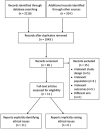Tele-Health Intervention for Carers of Dementia Patients-A Systematic Review and Meta-Analysis of Randomized Controlled Trials
- PMID: 33643022
- PMCID: PMC7902496
- DOI: 10.3389/fnagi.2021.612404
Tele-Health Intervention for Carers of Dementia Patients-A Systematic Review and Meta-Analysis of Randomized Controlled Trials
Abstract
Objective: The purpose of this study is to evaluate the major mental health outcomes on dementia patient carers when using psychoeducational programs and psychotherapeutic interventions. Methods: A meta-analysis was performed with randomized controlled trials of carers' tele-health interventions from the literature inception to December 31, 2019, using PubMed, EMBASE, and CENTRAL databases for articles. Results: The meta-analysis identified 1,043 results, of which 11 were randomized control trials. Among all 11 randomized control trials, only one study addressed face-to-face contact with online modules of interventions, four studies addressed telephone-based interventions, two studies reported on combined face-to-face contact and phone call interventions, two studies focused on web-based interventions, one study used video and telephone interventions, and one study conducted a computer-telephone integration system of intervention. The updated evidence suggested that there was more efficacy via tele-health interventions in lowering depression for carers of people with dementia. We outlined the delivery formation of intervention to evaluate the effectiveness and processes of major mental health improvements, including depression, burden, anxiety, and quality of life. Conclusions: In this study, tele-health intervention was shown to significantly lower depression and also lower the risk of mental health impairment. Although there was a significant decrease of depression, there were no significant differences in burden, anxiety, and quality of life. Future researchers are encouraged to carry out larger-scale studies; also, further analysis using a standardized assessment tool is suggested for future multi-component tele-health interventions.
Keywords: carers; dementia; intervention; meta-analysis; systematic review; tele-health.
Copyright © 2021 Zhu, Cao, Zhou, Xie, Cheng and Chu.
Conflict of interest statement
The authors declare that the research was conducted in the absence of any commercial or financial relationships that could be construed as a potential conflict of interest.
Figures



References
Publication types
LinkOut - more resources
Full Text Sources
Other Literature Sources
Miscellaneous

